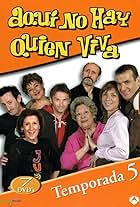Pedro, Luis, Raúl y Santi son cuatro amigos que se sienten un poco perdidos en el nuevo mundo de mujeres empoderadas, cada uno tratando de adaptarse a su manera.Pedro, Luis, Raúl y Santi son cuatro amigos que se sienten un poco perdidos en el nuevo mundo de mujeres empoderadas, cada uno tratando de adaptarse a su manera.Pedro, Luis, Raúl y Santi son cuatro amigos que se sienten un poco perdidos en el nuevo mundo de mujeres empoderadas, cada uno tratando de adaptarse a su manera.
- Premios
- 1 premio y 1 nominación en total
Explorar episodios
Reseñas destacadas
It is a funny comment on the situations of couples and romantic/sexual dynamics when men think they are "alpha males", but don't even know the origen of the concept.
Its main characters are the men but they are not the ones calling the shots, which is refreshing; still feels like third wave feminism, but good effort on including a guy constantly calling out on sexist behaviors, they chose to make him annoying, but still...at least it was there.
Overall is funny, entertaining and has a lot of subtext; it is not perfect, but opens the door to the discussion of the toxicity of patriarcal society on men and women.
Its main characters are the men but they are not the ones calling the shots, which is refreshing; still feels like third wave feminism, but good effort on including a guy constantly calling out on sexist behaviors, they chose to make him annoying, but still...at least it was there.
Overall is funny, entertaining and has a lot of subtext; it is not perfect, but opens the door to the discussion of the toxicity of patriarcal society on men and women.
I know this might come shocking as a comparison, but this series is by far the funniest one I've seen since Friends. It tackles relevant issues - gender identity, social culture, couple dynamics, you name it - with humour and a well balanced POV as it manages to present all these topics in a raw and relatable manner. It's definitely worth a watch if you are into light-hearted comedies that are rich in life content and manage to get through important messages in between the laughs and smirks. We are all human, we all struggle to identify who we are, how we should behave, and, more importantly, when to sit back and stop taking yourself too seriously.
The second season is just as good, if not better than the first, so I can't wait for the next season. Give it a chance - I've binge watched it with my hubby, and we couldn't put it to rest. It's a satire, it doesn't hold back, and that's the beauty of it. Enough with lukewarm dialogues, this one is fun and honest to express all kinds of opinions: enjoy the ridicule of some of the situations and get a chance to reflect.
The second season is just as good, if not better than the first, so I can't wait for the next season. Give it a chance - I've binge watched it with my hubby, and we couldn't put it to rest. It's a satire, it doesn't hold back, and that's the beauty of it. Enough with lukewarm dialogues, this one is fun and honest to express all kinds of opinions: enjoy the ridicule of some of the situations and get a chance to reflect.
... it's clever-dialogue throughout all ten-consistently-well-done-episodes ... all the characters-actors are engaging-talented ... production-values on-par-better than much-other-European-programming... it really is hoped they bring it back returning it for at minimum another season
... Ishita Chatterjee in her review at Midguard Times has it right: "The series is a tale of four men learning what their specific blind spots are regarding how they view women and working to make positive changes that will make their lives better. As for the comedy, it works well and takes on an absurdist tone in certain situations like the "vibrator" incident at school. And this makes the show more comical. Overall, [I'd] give this show a try if you want to enjoy a good dose of comedy that will tickle your senses and brain. 7/10"
... Ishita Chatterjee in her review at Midguard Times has it right: "The series is a tale of four men learning what their specific blind spots are regarding how they view women and working to make positive changes that will make their lives better. As for the comedy, it works well and takes on an absurdist tone in certain situations like the "vibrator" incident at school. And this makes the show more comical. Overall, [I'd] give this show a try if you want to enjoy a good dose of comedy that will tickle your senses and brain. 7/10"
10MLVC4E
Machos Alfa continues to prove that comedy can be a powerful tool to explore social issues with intelligence, freshness, and a bold approach. In its third season, the Caballero brothers, creators of hits like La que se avecina and Aquí no hay quien viva, delve deeper into gender dynamics and the challenges faced by modern men in a world that is evolving faster than many can keep up with.
The series follows a group of friends who, despite their different personalities, share a common crisis: their traditional concept of masculinity is constantly being questioned by their surroundings, particularly by the women in their lives. The plot unfolds as each of them tries to adapt (with varying degrees of success) to the new social rules, confronting their own biases, insecurities, and past mistakes.
What makes Machos Alfa so successful is its ability to blend humor with reflection. The series never feels preachy or moralistic but uses comedic situations and clever dialogue to highlight behaviors and attitudes that, while exaggerated at times, are more common than we might like to admit. From the use of inclusive language to conflicts over gender expectations in relationships, the writers tackle relevant issues without losing the light and entertaining tone that defines the series.
The cast remains one of the show's strongest points. Gorka Otxoa, Fernando Gil, Raúl Tejón, and Fele Martínez bring a unique chemistry that makes their characters believable and charismatic. Each of them has their own narrative arc, and it's fascinating to see how they evolve throughout the season. But one of the highlights of this third installment is the role of the female characters, played by actresses such as María Hervás, Raquel Guerrero, Paula Gallego, and Kira Miró. Their roles not only add depth and contrast to the series but are also key to some of the most memorable comedic moments.
The Caballero brothers' direction is solid and effective, maintaining a fast pace that makes the episodes fly by. The series continues to use visual and narrative resources typical of sitcoms, but it also allows for moments of deeper introspection and emotional weight, enriching the viewer's experience.
One of the keys to Machos Alfa's success is its accessibility to all audiences. The series has a laid-back, relatable tone that allows both men and women to see themselves in the situations presented. Additionally, it manages to address complex topics such as machismo, gender equality, and the redefinition of social roles in a natural and understandable way, without going to extremes or losing its humor.
While the show can be seen as a critique of traditional male behavior, it's also a celebration of people's ability to change and adapt. The male characters in Machos Alfa aren't portrayed as villains but as men who, like many others, are trying to find their place in a world that's no longer the one they knew. This humanistic and optimistic perspective is one of the aspects that makes the series so special.
Compared to other recent comedies, Machos Alfa stands out for its courage in addressing controversial social topics without losing its light-heartedness or ability to make people laugh. While other shows lean toward drama or moralizing, Machos Alfa dares to laugh at everything, including its own protagonists and the absurd situations they find themselves in.
The humor, as always in the Caballero brothers' work, is varied and effective, blending absurd situations, witty dialogue, and visual gags with references to current events and pop culture. The series isn't afraid to touch on taboo topics or take some situations to the extreme, but it always does so tastefully and with a clear intention to make the audience think while being entertained.
In terms of production, Machos Alfa maintains a high standard, with well-crafted cinematography and art direction that help create a coherent and appealing visual universe. The soundtrack also deserves special mention, as it reinforces the series' light and optimistic tone.
In conclusion, Machos Alfa is one of those comedies that achieves something very difficult: being both entertaining and relevant. Its ability to combine humor and reflection, along with a strong cast and well-constructed scripts, makes it one of the best Spanish comedies in recent years. The third season confirms that the Caballero brothers remain at the top of their game and have much to offer in the current television landscape.
For those who have followed the series from the beginning, this new installment is a natural and satisfying evolution of the characters and plots. And for those who haven't seen it yet, Machos Alfa is a perfect opportunity to enjoy a smart, contemporary comedy that not only makes you laugh but also invites you to reflect on the social changes we are living through.
The series follows a group of friends who, despite their different personalities, share a common crisis: their traditional concept of masculinity is constantly being questioned by their surroundings, particularly by the women in their lives. The plot unfolds as each of them tries to adapt (with varying degrees of success) to the new social rules, confronting their own biases, insecurities, and past mistakes.
What makes Machos Alfa so successful is its ability to blend humor with reflection. The series never feels preachy or moralistic but uses comedic situations and clever dialogue to highlight behaviors and attitudes that, while exaggerated at times, are more common than we might like to admit. From the use of inclusive language to conflicts over gender expectations in relationships, the writers tackle relevant issues without losing the light and entertaining tone that defines the series.
The cast remains one of the show's strongest points. Gorka Otxoa, Fernando Gil, Raúl Tejón, and Fele Martínez bring a unique chemistry that makes their characters believable and charismatic. Each of them has their own narrative arc, and it's fascinating to see how they evolve throughout the season. But one of the highlights of this third installment is the role of the female characters, played by actresses such as María Hervás, Raquel Guerrero, Paula Gallego, and Kira Miró. Their roles not only add depth and contrast to the series but are also key to some of the most memorable comedic moments.
The Caballero brothers' direction is solid and effective, maintaining a fast pace that makes the episodes fly by. The series continues to use visual and narrative resources typical of sitcoms, but it also allows for moments of deeper introspection and emotional weight, enriching the viewer's experience.
One of the keys to Machos Alfa's success is its accessibility to all audiences. The series has a laid-back, relatable tone that allows both men and women to see themselves in the situations presented. Additionally, it manages to address complex topics such as machismo, gender equality, and the redefinition of social roles in a natural and understandable way, without going to extremes or losing its humor.
While the show can be seen as a critique of traditional male behavior, it's also a celebration of people's ability to change and adapt. The male characters in Machos Alfa aren't portrayed as villains but as men who, like many others, are trying to find their place in a world that's no longer the one they knew. This humanistic and optimistic perspective is one of the aspects that makes the series so special.
Compared to other recent comedies, Machos Alfa stands out for its courage in addressing controversial social topics without losing its light-heartedness or ability to make people laugh. While other shows lean toward drama or moralizing, Machos Alfa dares to laugh at everything, including its own protagonists and the absurd situations they find themselves in.
The humor, as always in the Caballero brothers' work, is varied and effective, blending absurd situations, witty dialogue, and visual gags with references to current events and pop culture. The series isn't afraid to touch on taboo topics or take some situations to the extreme, but it always does so tastefully and with a clear intention to make the audience think while being entertained.
In terms of production, Machos Alfa maintains a high standard, with well-crafted cinematography and art direction that help create a coherent and appealing visual universe. The soundtrack also deserves special mention, as it reinforces the series' light and optimistic tone.
In conclusion, Machos Alfa is one of those comedies that achieves something very difficult: being both entertaining and relevant. Its ability to combine humor and reflection, along with a strong cast and well-constructed scripts, makes it one of the best Spanish comedies in recent years. The third season confirms that the Caballero brothers remain at the top of their game and have much to offer in the current television landscape.
For those who have followed the series from the beginning, this new installment is a natural and satisfying evolution of the characters and plots. And for those who haven't seen it yet, Machos Alfa is a perfect opportunity to enjoy a smart, contemporary comedy that not only makes you laugh but also invites you to reflect on the social changes we are living through.
Well, what can I say? This has been a pleasant surprise.
In a world in evolution four male friends are facing changes in the society that effects their own lives...
"Machos Alfa" approaches with irony topics that are serious and full of complexities. The result is a very enjoyable comedy in 10 episodes (but a second season has been confirmed) that is well written and supported by a cast that is just perfect.
I noticed that most of the very negatives comments are from men, and I am afraid that's because this series touches some 'exposed nerves' from little insecure and weak males. That level of nasty vitriol against the feminist movement seems to confirm that the show has hit the target. Well done.
Personally, I'm looking forward to season two.
In a world in evolution four male friends are facing changes in the society that effects their own lives...
"Machos Alfa" approaches with irony topics that are serious and full of complexities. The result is a very enjoyable comedy in 10 episodes (but a second season has been confirmed) that is well written and supported by a cast that is just perfect.
I noticed that most of the very negatives comments are from men, and I am afraid that's because this series touches some 'exposed nerves' from little insecure and weak males. That level of nasty vitriol against the feminist movement seems to confirm that the show has hit the target. Well done.
Personally, I'm looking forward to season two.
Argumento
¿Sabías que...?
Selecciones populares
Inicia sesión para calificar y añadir a tu lista para recibir recomendaciones personalizadas
- How many seasons does Alpha Males have?Con tecnología de Alexa
Detalles
Contribuir a esta página
Sugerir un cambio o añadir el contenido que falta

Principal laguna de datos
What was the official certification given to Machos Alfa (2022) in Brazil?
Responde

































